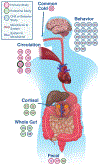Finding intestinal fortitude: Integrating the microbiome into a holistic view of depression mechanisms, treatment, and resilience
- PMID: 31454550
- PMCID: PMC6995775
- DOI: 10.1016/j.nbd.2019.104578
Finding intestinal fortitude: Integrating the microbiome into a holistic view of depression mechanisms, treatment, and resilience
Abstract
Depression affects at least 322 million people globally, or approximately 4.4% of the world's population. While the earnestness of researchers and clinicians to understand and treat depression is not waning, the number of individuals suffering from depression continues to increase over and above the rate of global population growth. There is a sincere need for a paradigm shift. Research in the past decade is beginning to take a more holistic approach to understanding depression etiology and treatment, integrating multiple body systems into whole-body conceptualizations of this mental health affliction. Evidence supports the hypothesis that the gut microbiome, or the collective trillions of microbes inhabiting the gastrointestinal tract, is an important factor determining both the risk of development of depression and persistence of depressive symptoms. This review discusses recent advances in both rodent and human research that explore bidirectional communication between the gut microbiome and the immune, endocrine, and central nervous systems implicated in the etiology and pathophysiology of depression. Through interactions with circulating inflammatory markers and hormones, afferent and efferent neural systems, and other, more niche, pathways, the gut microbiome can affect behavior to facilitate the development of depression, exacerbate current symptoms, or contribute to treatment and resilience. While the challenge of depression may be the direst mental health crisis of our age, new discoveries in the gut microbiome, when integrated into a holistic perspective, hold great promise for the future of positive mental health.
Keywords: Central nervous system; Depression; Endocrine system; Immune system; Inflammation; Microbiome; Microbiome-gut-brain axis; Microbiota; Prebiotics; Probiotics.
Copyright © 2019 The Authors. Published by Elsevier Inc. All rights reserved.
Figures




References
-
- Addolorato G, Mirijello A, D’Angelo C, Leggio L, Ferrulli A, Abenavoli L, … Gasbarrini G (2008). State and trait anxiety and depression in patients affected by gastrointestinal diseases: Psychometric evaluation of 1641 patients referred to an internal medicine outpatient setting. International Journal of Clinical Practice, 62(1), 1063–1069. 10.1111/j.1742-1241.2008.01763.x - DOI - PubMed
-
- Agusti A, Moya-Pérez A, Campillo I, Montserrat-de laPaz S, Cerrudo V, Perez-Villalba A , & Sanz Y (2018). Bifidobacterium pseudocatenulatum CECT 7765 Ameliorates Neuroendocrine Alterations Associated with an Exaggerated Stress Response and Anhedonia in Obese Mice. Molecular Neurobiology, 55(6), 5337–5352. 10.1007/sl2035-017-0768-z - DOI - PubMed
Publication types
MeSH terms
Grants and funding
LinkOut - more resources
Full Text Sources
Other Literature Sources
Medical
Miscellaneous

